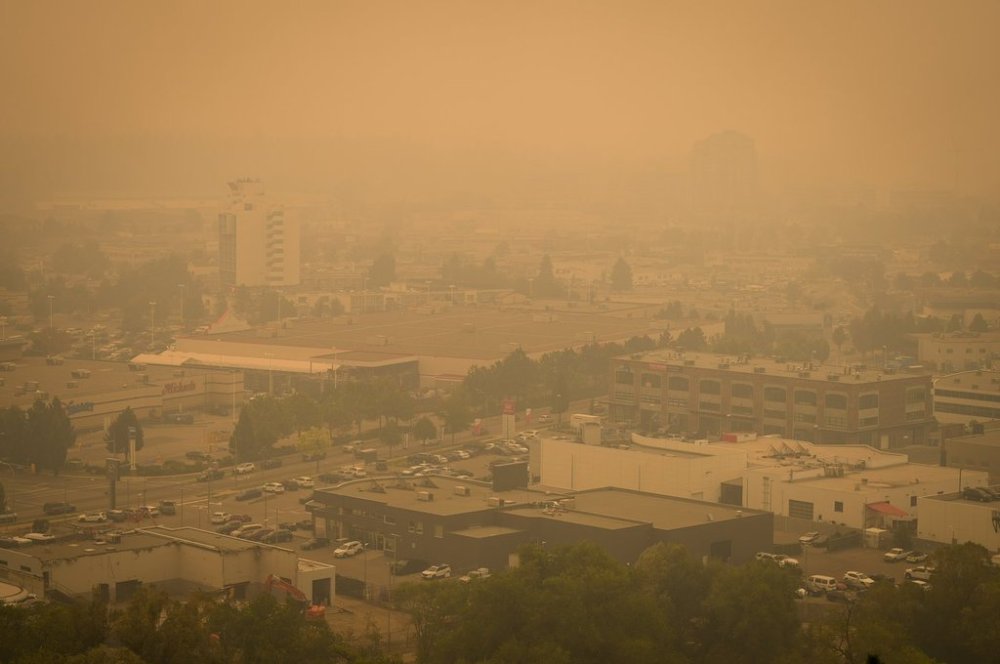Science
Record Canadian Wildfires Linked to Over 82,000 Deaths Globally

A recent peer-reviewed study has revealed that smoke from the devastating wildfires in Canada during 2023 is estimated to have caused approximately 5,400 acute deaths and around 82,100 premature deaths worldwide. Published in the journal Nature, the study highlights the extensive health burdens resulting from the record-breaking wildfire season.
The research utilized a variety of computer models and data sources to assess the mortality linked to particulate pollution, specifically PM2.5, generated by the wildfires. According to the study, the period from June 26 to July 7, 2023 was particularly severe, leading to an estimated 5,400 acute deaths across Canada and the United States.
Michael Brauer, a professor at the University of British Columbia and one of the study’s co-authors, emphasized the importance of these findings. He stated that they serve as a “wake-up call” for regions not typically exposed to wildfire smoke. As climate change intensifies, the health impacts of such smoke are expected to escalate.
Of the 82,100 premature deaths attributed to prolonged exposure to the smoke, the study indicates that 64,300 occurred in North America and Europe. This includes approximately 33,000 deaths in the United States and about 8,300 in Canada. The research underscores how wildfire smoke exacerbates existing health conditions, particularly those related to heart and lung diseases, potentially leading to earlier fatalities.
As the 2023 wildfire season marked a historic increase, with over 6,000 fires burning through 150,000 square kilometers of land, the consequences of this environmental crisis were felt far beyond Canadian borders. According to Natural Resources Canada, this year ranks as the second-worst wildfire season on record, with more than 83,000 square kilometers impacted.
Brauer and his team, which included scientists from both China and the United States, warned that the frequency of severe wildfire seasons will likely continue to rise. “We’re seeing, with a warmer climate, that we’re getting kind of record or close-to-record fire seasons repeatedly every summer,” he noted, adding that this trend contributes to an increased risk of premature deaths.
The research further indicates that the Canadian wildfires accounted for 13 percent of global fire-related exposure to fine particulate matter in 2023. Although the smoke that traveled to parts of Europe was less concentrated, it affected densely populated areas, amplifying its public health implications.
In conclusion, while smoke from Canadian wildfires has had dire health effects across continents, Brauer points out that the greenhouse gas emissions fueling climate change—and consequently, severe wildfires—are a pressing global challenge. The study not only highlights the immediate health risks associated with wildfire smoke but also serves as a critical reminder of the broader implications of climate change on public health.
-

 Science3 months ago
Science3 months agoToyoake City Proposes Daily Two-Hour Smartphone Use Limit
-

 Top Stories3 months ago
Top Stories3 months agoPedestrian Fatally Injured in Esquimalt Collision on August 14
-

 Health3 months ago
Health3 months agoB.C. Review Reveals Urgent Need for Rare-Disease Drug Reforms
-

 Technology3 months ago
Technology3 months agoDark Adventure Game “Bye Sweet Carole” Set for October Release
-

 World3 months ago
World3 months agoJimmy Lai’s Defense Challenges Charges Under National Security Law
-

 Lifestyle3 months ago
Lifestyle3 months agoVictoria’s Pop-Up Shop Shines Light on B.C.’s Wolf Cull
-

 Technology3 months ago
Technology3 months agoKonami Revives Iconic Metal Gear Solid Delta Ahead of Release
-

 Technology3 months ago
Technology3 months agoApple Expands Self-Service Repair Program to Canada
-

 Technology3 months ago
Technology3 months agoSnapmaker U1 Color 3D Printer Redefines Speed and Sustainability
-

 Technology3 months ago
Technology3 months agoAION Folding Knife: Redefining EDC Design with Premium Materials
-

 Business3 months ago
Business3 months agoGordon Murray Automotive Unveils S1 LM and Le Mans GTR at Monterey
-

 Technology3 months ago
Technology3 months agoSolve Today’s Wordle Challenge: Hints and Answer for August 19









